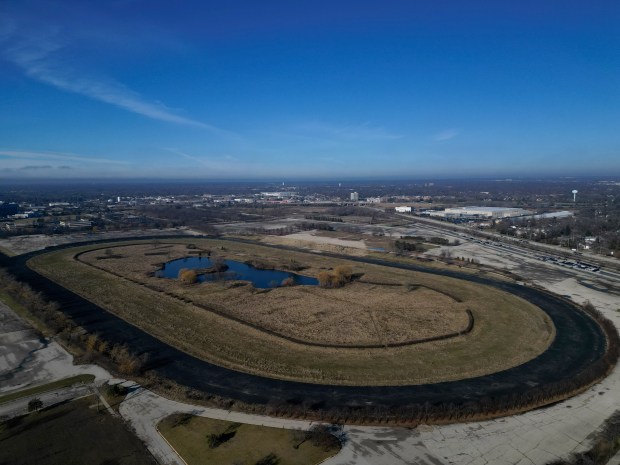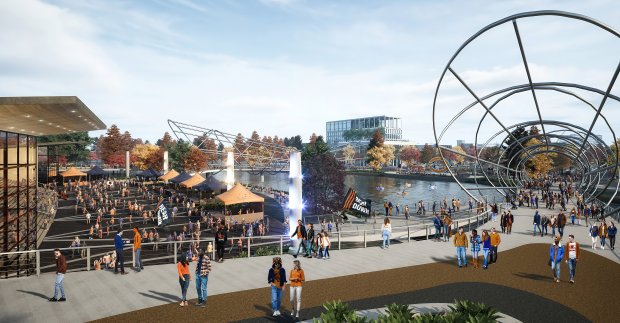The Chicago Bears are shifting focus to a new stadium in Arlington Heights, a project that would depend on state legislation allowing for negotiated financing of large-scale development projects.
“Over the last few months, we have made significant progress with the leaders in Arlington Heights, and look forward to continuing to work with state and local leaders on making a transformative economic development project for the region a reality,” the team said in a statement to the Tribune on Friday.
The stadium would be part of a 326-acre mixed use development that would include an entertainment district that would help fund the deal. It would be dependent on reaching agreement with local taxing bodies over property taxes, infrastructure funding and other financial aspects.
The Bears’ decision to turn its attention back on building a stadium complex in Arlington Heights opens the latest, but likely not the final, chapter in a stadium saga that has percolated across the region for years.
The Bears have played in Chicago ever since the signature NFL franchise moved from Decatur in the early 1920s, but the team’s two main homes in the city — Wrigley Field and Soldier Field — have always been owned by others, and neither has been a perfect fit for the team.
Should the team move forward with relocating to the former Arlington International Racecourse site, the Bears would have significantly more control not only over the stadium that would be built but the surrounding acres.
The move would also mean the team is turning its back on officially hosting its home games in the city of Chicago, which would bruise the city’s ego and be a political hit for Mayor Brandon Johnson. On Friday, Johnson’s office did not immediately respond to a request for comment.
While it would be a hit to the mayor, the relocation wouldn’t come as a total surprise.
The Bears two years ago purchased the 326-acre former Arlington International Racecourse property and cleared the area, demolishing its grandstand and several other buildings.
The franchise’s plan – included in a “preliminary master plan vision” – included a domed stadium surrounded by a hall of fame, a store and a tailgating green, with an expansive entertainment district nearby. The team declared the site would be a year-round destination that could host Super Bowls, Final Fours, big college football games, concerts and more.
Arlington Heights’ new mayor, Jim Tinaglia, recently told the Tribune he embraced the master plan and envisioned “a place for people to visit, enjoy, experience, spend money and then leave. And then the next people would come, enjoy, spend money and then leave.”
While the Bears owned the land in Arlington Heights, they also continued to work on trying to stay in the city, last spring unveiling a roughly $5 billion plan with Johnson to build a domed stadium just south of Soldier Field.
But those plans quickly hit a wall because it required state funding and support from lawmakers in Springfield. Gov. JB Pritzker and Democratic leaders in the legislature greeted the proposal with skepticism.
Even before Warren joined the team in early 2023 and pivoted focus back to building a new stadium on the lakefront, Pritzker had repeatedly made it clear he was wary of providing public funds to help a professional sports franchise build a new stadium.
Nevertheless, the Bears maintained their pitch for a stadium in the shadow of the current Soldier Field, asking the state to take on $900 million in new debt and spend $1.5 billion on infrastructure improvements to help make the team’s vision of a domed stadium on a revamped lakefront a reality.
The proposal included additional refinancing and borrowing through the Illinois Sports Facilities Authority that the agency’s CEO estimated could cost $4.8 billion over 40 years.
The shift of focus back to Arlington Heights became more apparent this spring when Warren told the Tribune at the NFL owners meeting in Florida that the team’s “focus now is both downtown and Arlington Heights.”
While losing the Bears would be a major political loss for Johnson after he gave his full-throated endorsement for the team’s lakefront plan, many observers long expected the team ultimately would decamp for Arlington Heights after spending $197 million to purchase the racetrack property.
But the team will likely still look to state lawmakers for help with the project, even if it’s in the northwest suburbs.

One of the holdups with the move to Arlington Heights was a dispute with the village and local school districts over property taxes on the property.
The Bears agreed late last year to pay a reduced property tax bill of $3.6 million to settle the issue, but the team and the local taxing bodies also agreed to lobby state lawmakers for legislation that would deliver more certainty on real estate taxes for decades into the future.
Such proposals have been introduced in Springfield multiple times in recent years but have stalled.
With state lawmakers grappling with the most difficult budget situation they’ve faced since at least the start of the COVID-19 pandemic, it’s unclear whether there will be any movement on a proposal that would smooth the Bears’ path to Arlington Heights before the legislature’s scheduled adjournment at the end of the month.
But one pending measure from state Rep. Mary Beth Canty, an Arlington Heights Democrat and former village trustee, would freeze property tax assessments for designated “mega projects” and allow governments to negotiate with property owners over what the tax bills would be.
“This is not a bill about the Chicago Bears,” Canty said Tuesday. “This bill actually doesn’t speak at all to any particular development, developmental location.”
Still, the deal could be beneficial for a massive Bears stadium project in Arlington Heights.
The legislation calls for creating a new tool to help local governments across the state pursue a “game-changing type of development that will spur something new in their community.”
“It’s not for (the Bears) in one location,” Canty said. “It is relevant to any community across the state of Illinois, as it should be as a state statute, right? So, yes, would they be able to try and take advantage of it with local municipalities? Sure, but that could happen in Rockford. It could happen in Arlington Heights. It could happen in the city of Chicago.”




